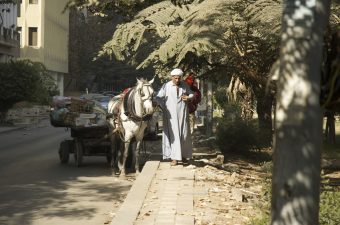 Karl Ammann (center) explains why wildlife trade in the Middle East goes unregulated.
Karl Ammann (center) explains why wildlife trade in the Middle East goes unregulated.
In 2007, Karl Ammann appeared on Time Magazine’s Heroes of the Environment List, and for good reason. Since discovering 2,004 smoked primates and 1,000 fresh carcasses on board Zaire river boats in1988, he has devoted his life to exposing both the bushmeat and illegal wildlife trafficking. His photography and writings have appeared in several outlets including the New York Times Magazine, Newsweek, Stern Magazine, and the National Geographic Almanac, and he has recently co-authored two books namely Conserving Nature with Tony Rose and others, and Eating Apes with Dale Peterson. For his work, he has received a slew of accolades.
We met him this past weekend in Nairobi, Kenya, where we discussed private reserves throughout the Middle East that show off illegal wildlife without any retribution from the authorities. Even CITES, the international organization tasked with regulating wildlife trafficking, has been notoriously lackadaisical about bringing offenders to task.
 Karl, you first became interested in bushmeat trade before switching your focus to wildlife trafficking. Can you talk about this?
Karl, you first became interested in bushmeat trade before switching your focus to wildlife trafficking. Can you talk about this?
“I’ve kind of moved away from Bushmeat. It’s a mess in Central Africa with no answers in sight. What’s the point of banging your head against the wall. You’ve done everything you can to expose the situation – policymakers, NGOs, and everyone else can no longer say they didn’t know what’s going on.”
So what you are you working on at the moment?
“Right now I’m making a film about the reptile skin trade – about over-exploitation, CITES export licensing for the Guccis of the world – all essentially illegal.”
Where do you market your films?
“It’s definitely not a moneymaker but I seem to have good luck in South Africa, Scandinavia and Germany. The American market is very difficult because they want happy endings, and my stories don’t have happy endings.”
Africa Geographic did a piece on wildlife trafficking in the Middle East – can we focus on that for a bit?
“I didn’t really do any work there. I mean, I went to Dubai and visited the zoo director there, asked him about his chimps and where they came from and went to Qatar and asked where those chimps came from. It’s a mess – Kuwait, the whole region.
One journalist with Gulf News has been good about picking up stories and running with them, to some extent, but the expat community doesn’t want to confront the issue. They’re afraid to even send emails. If they’re afraid to send emails, that’s a pretty good indication that it’s not safe. People who have helped me have been harassed, they’ve been threatened, and it’s still going on.”
The Egyptian wildlife dealer Heba Abdel Moty Ahmed Saad has eluded prosecution for thirty years. Is she still around?
“I doubt it – she has probably retired by now. But her two daughters are still operating out of Nigeria. There are also another two or three dealers operating who can pretty much get anything you want. The trouble is in Black Africa, Sub-Saharan Africa, many wildlife dealers are third generation. This is nothing new to them. In the old days the trade went into Europe. Now there are more restrictions, to some extent, but also more money.”
Who in the Middle East is interested in buying wildlife?
“Mostly private collectors that have a lot of money. Saudi, Qatar, and the Emirates behind their walled estates, the Arabs feel entitled to have lions and tigers in the backyard. And because they have a closed society they get away with it. They have their private jets with crates – no one is going to open those up.
So, okay, Dubai had to open up a bit, but the expat community don’t dare to talk about what happens behind closed doors in Saudi for example. And they have high profile wildlife – Chimps, Gorillas, Orangutans, Lions, Tigers.”
What are some of the challenges you have faced trying to investigate illegal wildlife trafficking?
“Well, we’ve managed to get in with hidden cameras and that kind of thing. My hotel room was once broken into and all of my photos were stolen. And two guys who were helping me out were beaten in the desert and begging for their lives. You have no rights. So we learned that if you push too hard the curtains come down everywhere.”
Do you plan to go back to Egypt?
“I’m working on that at the moment to see if its’ even possible. But everyone knows me very well and the minute they see me they start making phone calls, so there’s very little that I can do now.”
Where are most of the wildlife being kept?
“It’s hard to say because they are walled in and you get shot at if you try to approach, but mostly along the road connecting Alexandria and Cairo.
Then there is Tamer In Animal Kingdom. He breeds dogs and horses but he also breeds lions, tigers, and ligers – half tiger and half lion. Where ever you find his dogs, there will be other wildlife too. I’m not even sure yet where he is?”
How is it even possible to get a permit for certain wildlife like Chimps and Gorillas?
“Oh. Don’t get me started. After filming, I’ve come to the conclusion that CITES is a total joke. We went to the Geneva Standing Committee meeting to interview the Chinese delegation and were physically kicked out. Then the Chief Enforcement Officer traveled to Egypt where one of the worst traffickers had chimps and gorillas in his backyard by the dozen.
So the officer decided that maybe something did need to change but that they should be given a chance – usual CITES crap – and within weeks of him leaving, pictures emerged of new baby gorillas that arrived. So then CITES sent who I believe was a filing cle rk who reported that everything was fine and at the Doha meeting the case was closed. I asked to see the report and was offered the summary. When I asked for details they told me that it was confidential, which is in violation of internal CITES rules. In my opinion, CITES is a big part of the problem.”
rk who reported that everything was fine and at the Doha meeting the case was closed. I asked to see the report and was offered the summary. When I asked for details they told me that it was confidential, which is in violation of internal CITES rules. In my opinion, CITES is a big part of the problem.”
So, what do you think should be done about zoos and private collections?
“I understand where zoos come from – I have two chimps who have a good life and are properly cared for. And I understand sanctuaries because orphans need a home. I have no problem with that. An animal that is born in the San Diego zoo and that has access to food and water and social interaction can have a pretty good life. But in third world countries like Egypt where millions of people are close to the starvation line, does it make sense to have to look after animals?
There are reports of people slaughtering zoo animals for meat. The point is in countries where there is poverty, the people come first, they always do, and the animals pay the price. These places should be shut down.”
For more information about Karl’s work, to see his photographs, or to learn more about wildlife trafficking and the bushmeat trade, please visit his website: http://karlammann.com. If you want to contact Tamer in Animal Kingdom, his email address is: [email protected]
All images herein were taken by Karl Ammaan, with the exception of the Daily Green image of him.
More on wildlife trafficking and conservation efforts in the Middle East:
Interpol Gets Tough On Green Crimes
Man Arrested Attempting to Smuggle Golden Falcon Eggs
Where Have All The Iranian Leopards Gone?



